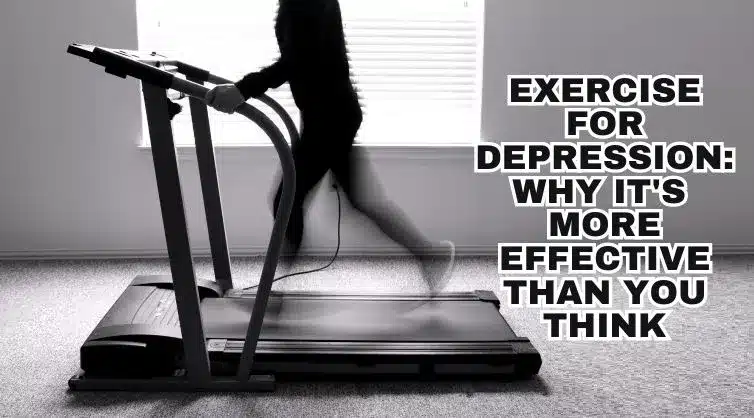Are you feeling down or anxious? If you’re struggling with depression, exercise might be the last thing on your mind. However, studies show that exercise can be a powerful tool in combating depression. In fact, it’s more effective than you might think.
Depression is a common mental health disorder that affects millions of people around the world. It can make it difficult to enjoy life, work, and even carry out simple tasks. While there are many different treatments for depression, exercise is one that often gets overlooked. But exercise can provide a wide range of benefits for both your physical and mental health.
In this article, we’ll explore the benefits of exercise for depression and why it’s more effective than you might think. We’ll also provide tips on how to incorporate exercise into your daily routine and make it a habit. So, let’s get started!
The Benefits of Exercise for Mental Health
While the physical benefits of exercise are well-known, its mental health benefits are often overlooked. Regular exercise has been shown to have several positive effects on mental well-being, including improved mood, increased self-esteem, stress relief, and improved sleep.
One of the primary ways exercise impacts mental health is by producing endorphins. These chemicals are released by the body during physical activity and are known to improve overall mood and reduce feelings of anxiety and depression. In addition to endorphins, exercise has also been shown to increase levels of serotonin and norepinephrine, which are neurotransmitters that play a role in mood regulation.
In addition to its mood-boosting effects, exercise can also help to improve self-esteem and body image. It can lead to increased confidence and a more positive outlook. Exercise has also been shown to be an effective stress reliever, as it helps to release tension and calm the mind. Finally, regular physical activity can help to regulate the body’s sleep-wake cycle, leading to better quality and more restful sleep.
Overall, the benefits of exercise for mental health are numerous and well-established. By incorporating regular physical activity into your routine, you can improve not only your physical health but also your mental well-being.
How Exercise Can Help Treat Depression
Exercise has been proven time and time again to be an effective treatment for depression. Multiple studies have found that regular physical activity can be as effective as medication in reducing symptoms of mild to moderate depression.
One of the primary ways exercise helps to treat depression is by increasing the production of neurotransmitters such as serotonin and norepinephrine, which play a role in mood regulation. Exercise has also been shown to increase the production of endorphins, the body’s natural feel-good chemicals. These effects can help improve overall mood and reduce anxiety and depression.
As well as being effective on their own, exercise can be done alongside other treatments. Such as therapy or medication to increase the overall effectiveness of the treatment. It is known as combination therapy.
One of the significant benefits of exercise as a treatment for depression is that it has no adverse side effects. In contrast, some medications used to treat depression can have unpleasant side effects such as weight gain, sleep disturbance, and sexual dysfunction. Exercise not only helps to improve mental health but also has additional benefits, such as improving physical health and fitness.
In conclusion, exercise is a safe and effective treatment for depression that can be used alone or in combination with other therapies. Its numerous benefits make it a valuable tool in treating this common mental health condition.
Tips for Incorporating Exercise into Your Depression Treatment Plan
Considering incorporating exercise into your depression treatment plan, it’s essential to consult a healthcare provider or mental health professional. They can help you determine the right amount and intensity of exercise for your specific needs and ensure that it is safe for you to begin an exercise program.
One key to success is finding an activity that you enjoy. The more you want the activity, the more likely you will stick with it. Experiment with different types of exercise, such as walking, running, dancing, or swimming, to find what works best for you.
Start small and gradually increase the intensity and duration of your workouts. Even a 10-minute walk can have benefits. As you become more comfortable and confident in your ability to exercise, you can gradually increase the length and intensity of your workouts.
Seeking support can also help you stay motivated and accountable. Find a workout buddy or join a gym or exercise class to keep on track and stay motivated.
By following these tips and working with a healthcare provider or mental health professional, you can effectively incorporate exercise into your depression treatment plan and begin to experience its numerous benefits.
Conclusion
In conclusion, regular exercise has numerous benefits for mental health and has been proven to be an effective treatment for depression. It can improve mood, increase self-esteem, provide stress relief, and improve sleep, among other benefits. Exercise can be used alone or in conjunction with other treatments, such as therapy or medication, to enhance the overall effectiveness of treatment.
If you’re seeking treatment for depression, we encourage you to consider incorporating exercise into your treatment plan. Just remember to consult with a healthcare provider or mental health professional to determine the right amount and intensity of exercise for your specific needs and to ensure that it is safe for you to begin an exercise program.
By adding exercise to your treatment plan, you can experience its numerous benefits and take an active role in improving your mental well-being. Don’t let depression hold you back any longer – take control of your mental health and give exercise a try.












